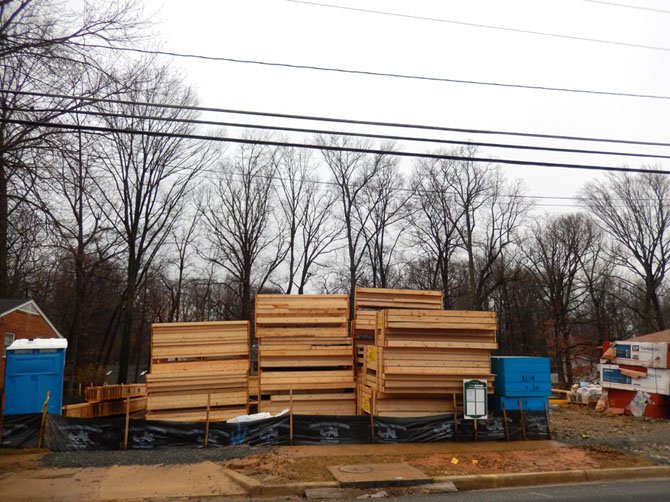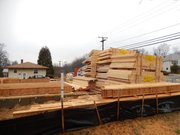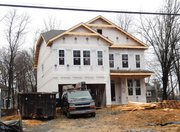Town Council Hears Noise Complaint
“Construction noises are excessive and are unusually loud.”
-- Melanie Meren
Imagine living in a place so noisy that children have a hard time sleeping. Melanie Meren doesn’t have to – that’s her reality. She lives in the Town of Vienna, but close to a construction site.
And last Monday, Feb. 3, she shared her concerns with the Vienna Town Council. She then asked the Council to re-examine and revise the town’s noise ordinance to decrease the allowable hours of home construction so existing residents can have some peace and quiet.
“The noise ordinance doesn’t protect us as residents,” said Meren. “It’s completely biased in the builders’ favor.”
She and her family – including a 4-year-old and a 9-month-old baby – live on Kingsley Road, where builders are constructing multiple residential projects on that same block. And the noise from their work goes on six days a week, 12-13 hours a day.
“We take pride in Vienna being a great place to raise families,” said Meren. “But those of us living near construction live in a noise-polluted environment and we residents have no protections against it.”
MEREN NOTED that the noise ordinance prohibits the creation and maintaining of excessive, loud noise detrimental to the normal tranquility of residential neighborhoods and “unusual and unnatural in [its] time and place.” But it lets builders do so – and for long periods of time. Construction’s allowed every day but Sunday, 7 a.m.-8 p.m., and equipment may be loaded and unloaded from 6 a.m.-11 p.m.
“Construction noises are excessive and are unusually loud,” said Meren. “They are unusual and unnatural in their time and place.” According to the ordinance, she said, running engines for more than three minutes is a violation.
“And yet, construction vehicles pour concrete for hours at a time, and bulldozers and diggers sit idling for hours waiting for work to begin,” she said. “The noise ordinance needs to reflect the reality that, in our communities, there are multiple construction projects happening. There are four in my immediate block, alone, and another is slated to happen across the street from me.”
Meren said the nearly constant noise constitutes a “public nuisance” and adversely affects her efforts to run her Vienna-licensed business from her home. The noise has forced her to change how, when and where in her house she speaks with clients. It’s also degraded her family’s ability to enjoy their home like others would.
She told the Council about laying her baby down to sleep in his room with two, white-noise machines on simultaneously – and later comforting him when he was woken up by a truckload of gravel being dumped outside his window, 20 feet from his head. One day, in desperation, Meren even put him down for a nap in the bathroom with the exhaust fan on to provide enough background noise so he could sleep.
She said the noise is relentless, no matter the time of day. She was jolted awake in the morning by the 6:38 a.m. delivery of a dumpster while a beeping construction truck moved back and forth outside her bedroom window. And at 6 p.m. dinner, construction sounds that begin each day at 7 a.m. still persist.
Meren described nearly entire days “filled with the sound of a bulldozer wrecking a house, including the demolishing sounds and the maddening beeping of the machine going backwards; a digger dropping demolished house wreckage for days into a dumpster that was so loud it made the ground shake; a truck pouring concrete from 50 feet [above]; hammering and nail guns shooting; unloading of container trucks and dumpsters dropping to and shaking the ground; two generators running all day long to provide power for the construction; and materials crashing into a dumpster when thrown from the second story of the house.”
She also expressed a safety concern, saying construction companies dig up sewer lines to replace them, but usually leave a 12- 15-foot hole open for months, close to the sidewalk. “Many companies place just two pieces of caution tape around four poles to mark it,” said Meren. “This poses a tremendous safety risk to pedestrians, especially young children who walk to school or play nearby. Must we wait for a tragedy to happen before putting some safeguard policy in place?”
Additionally, she said, besides making the neighborhood look “neglected, rundown and unkempt, in the summer these holes hold water that breeds mosquitoes. “We want our families and children to be healthy,” said Meren “We want a pleasant community.”
She asked the Council to specify an amount of time before these holes should be filled in and exactly how they should cordon them off completely. She also said construction companies should be accountable for keeping the sidewalks clear and passable.
“Many contractors rip up the sidewalk for months,” said Meren. “Sometimes they’ll lay down gravel or dirt and, over time, it becomes a rocky, muddy mess, forcing pedestrians – including parents with strollers, kids, bicyclists and those with pets – to walk in the street. What does this say about the livability of our community? Protect the residents – our homes should be our havens.”
Councilman Howard Springsteen told her, “You can’t block a sidewalk, so I encourage you to call our Public Works Department or Planning and Zoning.” And Vice-Mayor Laurie DiRocco asked if the town could examine the noise-decibel level in its noise ordinance.
TOWN ATTORNEY Steven Briglia said the ordinance doesn’t contain such levels for residential areas, just in industrial zones. “If we did, it would apply to everyone, including backyard parties and loud music,” he said. But he suggested the Council examine the ordinance during a work session.
“It’s the constant noise at high levels,” said Meren. “It’s great that more homes are coming, but we have to live here, too.”


